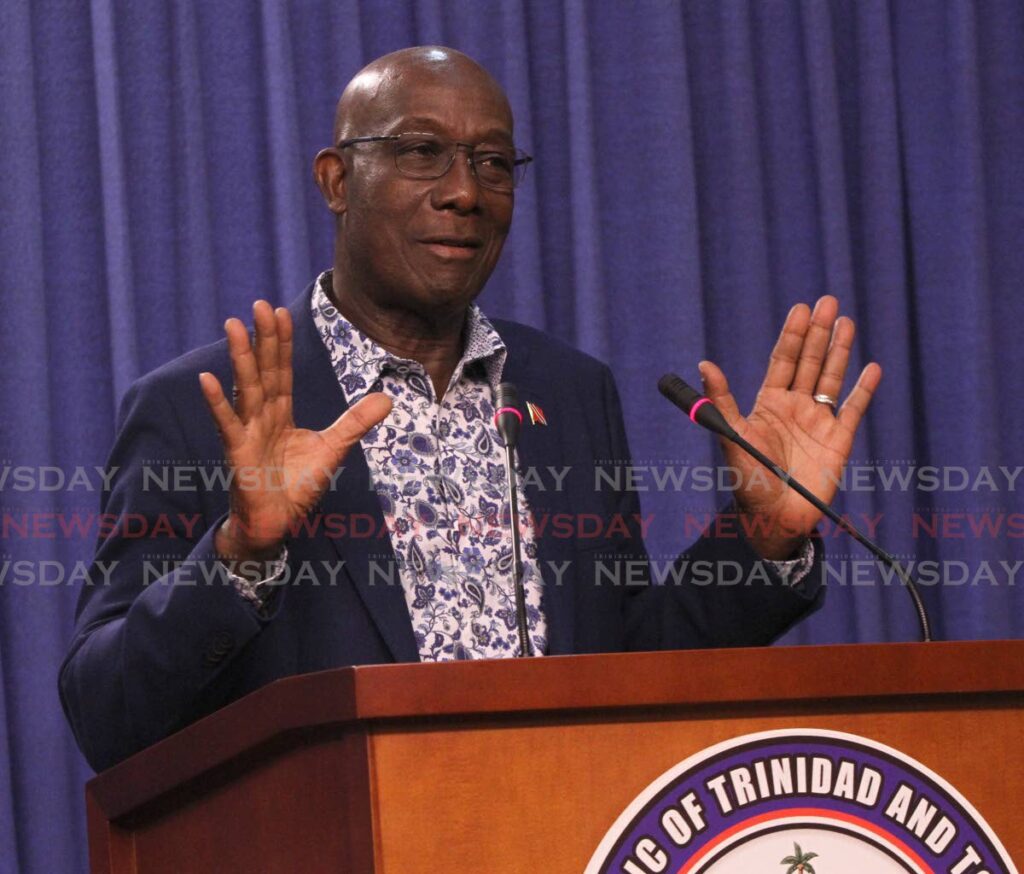Government’s Carnival caution as cases rise: DON’T PLAY WITH COVID

The Prime Minister said there are no plans to disrupt Carnival celebrations with new restrictions, even though covid19 cases are projected to be in the hundreds in a few weeks, given current trends. He urged people to take personal responsibility for their health during the period, including getting vaccinated.
Speaking at a media conference at the Diplomatic Centre, St Ann’s, Port of Spain, on Thursday, the Prime Minister said the country had been approaching a level of normality after almost three years of being in the pandemic. He said while there has been an uptick in cases, the situation does not yet warrant an intervention outside the basic precautions of wearing masks, washing hands, and watching distances.
“We are not approaching this phase of our existence by trying to shut out the virus, as we have all the variants of concern present. Closing the border is not a necessary response at this time.
"Our response has to be to suppress the spread of what we have among us. Half of our population was vaccinated, while a large part of the unvaccinated population got immunity by catching the virus. We’re not in the same position as previously.
“Now in Trinidad and Tobago we’ve gone through Christmas and we are going into a Carnival, where the nature of Carnival is meeting and mixing. We do not believe the situation warrants us to not have Carnival, but we believe it warrants us taking personal decisions about your exposure, to minimise instances of requirement for health-care delivery to you.
“Many people have and would get infected going forward and not need health care, and these are the largest percentage of the population. But there is that smaller population to whom the virus is a very dangerous threat.
"We’re not disrupting the economy, we’re not disrupting the border, we are living with covid19.”
Epidemiologist Dr Avery Hinds said there has been an upward trend in the number of covid19 cases as well as the percentage positivity of patients tested.

“From the week that ended on Christmas Eve to the week that ended on New Year’s Eve, there was a 38.8 per cent increase in the weekly totals, and the following week was 65.7 per cent higher than that. So we are seeing an uptick in the speed at which the weekly totals are increasing. We know that it is driven to some extent by all the gathering and mingling we would have done, and we note it will be driven further by the gathering and mingling we plan to do. So we need to put out cautionary advice to bear in mind the potential for spread.”
He said the projections show a fairly rapid increase in the expected number of cases per day.
“It was 58 at the last update. By the middle of next week, if we continue at the rate that we’re going at, the average number of cases may be in the low hundreds, and the week after that might be in the high hundreds. So we know we will see increases in the number of cases, especially as we have more movement, more gathering, more mingling, that is unlikely to decelerate.
"So it’s another reason for people to get vaccinated to protect themselves and their loved ones.”
Dr Rowley said the virus is showing its ability to infect more quickly and efficiently. He said the one common action being taken in countries worldwide to deal with the virus was the mask.
Health Minister Terrence Deyalsingh said it was the increase in cases and the presence of the new variant which led the ministry to begin its mall drive exercise last weekend, in addition to continuing to offer covid19 and influenza vaccines at health centres, especially in light of increased visitor arrivals during Carnival.
“The response far exceeded our expectations, as between Friday and Saturday we gave out 500 covid19 vaccines and 1,500 flu vaccines. In all we have administered 29,962 flu vaccines in the last two months, compared to last season’s figure of 26,000. Unfortunately only 452 children under five, 383 pregnant women, and 867 health-care workers were vaccinated.”
CMO Dr Roshan Parasram reminded that the groups most vulnerable to covid19 were those over 60, children under two years old and/or with comorbidities, and people with hypertension, diabetes, asthma and other respiratory diseases, and cancer and other immune-compromising conditions.
He said people who had got the AstraZeneca and Pfizer vaccines could get a first booster six months after their second dose, those with Sinopharm three months after their second dose, and those with J&J could get the first booster two months after the initial dose. He said the second booster could be taken four-five months after the first. He said people should wait three months after getting covid19 to get vaccinated. Parasram said the WHO had not approved the use of a third booster.
Deyalsingh said the World Health Organization said the covid19 vaccines were interchangeable. He said the ministry currently has 244,788 Sinopharm doses on hand, expiring in June 2023, and 185,286 J&J doses, expiring in May/July 2023.
He urged the population to get vaccinated now.

Comments
"Government’s Carnival caution as cases rise: DON’T PLAY WITH COVID"